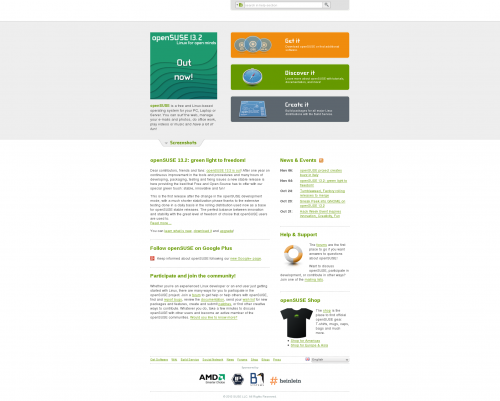OpenSUSE 13.2: Difference between revisions
Appearance
Grammar/spelling corrections |
m Added latest version |
||
| (6 intermediate revisions by the same user not shown) | |||
| Line 1: | Line 1: | ||
This | {{No support}} | ||
This was the Linux distribution my server was based on. More information is available [https://www.opensuse.org/en here]. | |||
If you are looking to install openSUSE, you should consider installing {{Current openSUSE}}, the latest version. | |||
If you are still looking to install openSUSE 13.2, there are more details in [[Obtaining openSUSE 13.2|obtaining openSUSE 13.2]]. | |||
== Installation notes == | == Installation notes == | ||
* The CrashPlan GUI client needs settings changed to make it work otherwise is will open for a few seconds and crash. This is a long withstanding issue from the previous release. Please see [[CrashPlan client closes in some Linux installations|this page]] for the settings. The memory settings on the server line also need changing to allow more memory usage (change <code>-Xmx512</code> to at least <code>-Xmx1024</code>, recommended <code>-Xmx2048</code>). | * The CrashPlan GUI client needs settings changed to make it work otherwise is will open for a few seconds and crash. This is a long withstanding issue from the previous release. Please see [[CrashPlan client closes in some Linux installations|this page]] for the settings. The memory settings on the server line also need changing to allow more memory usage (change <code>-Xmx512</code> to at least <code>-Xmx1024</code>, recommended <code>-Xmx2048</code>). | ||
* Samba will need the <code>root</code> user setting up manually as YaST has lost the ability to do this on the first run after it's port to Ruby. | * Samba will need the <code>root</code> user setting up manually as YaST has lost the ability to do this on the first run after it's port to Ruby. To do this, open the terminal and <code>su</code>. When in <code>su</code>, type <code>smbpasswd -a root</code>. This will prompt for the password you would like to use and then create the root user. | ||
== Information == | == Information == | ||
openSUSE 13.2 was released on 4th November | openSUSE 13.2 was released on 4th November 2014. It is an open-source distribution and is free of charge. It is developed by the community and sponsored by [https://www.novell.com/home/ Novell]. | ||
[[File:OpenSUSE_13.2_website.png|500px]] | [[File:OpenSUSE_13.2_website.png|500px]] | ||
| Line 14: | Line 20: | ||
== Previous supported versions (at time of release) == | == Previous supported versions (at time of release) == | ||
[[openSUSE 13.1]] | * [[openSUSE 13.1]] | ||
[[openSUSE 12.3]] | * [[openSUSE 12.3]] | ||
Latest revision as of 22:34, 4 December 2020
This was the Linux distribution my server was based on. More information is available here.
If you are looking to install openSUSE, you should consider installing openSUSE Leap 16.0, the latest version.
If you are still looking to install openSUSE 13.2, there are more details in obtaining openSUSE 13.2.
Installation notes
- The CrashPlan GUI client needs settings changed to make it work otherwise is will open for a few seconds and crash. This is a long withstanding issue from the previous release. Please see this page for the settings. The memory settings on the server line also need changing to allow more memory usage (change
-Xmx512to at least-Xmx1024, recommended-Xmx2048). - Samba will need the
rootuser setting up manually as YaST has lost the ability to do this on the first run after it's port to Ruby. To do this, open the terminal andsu. When insu, typesmbpasswd -a root. This will prompt for the password you would like to use and then create the root user.
Information
openSUSE 13.2 was released on 4th November 2014. It is an open-source distribution and is free of charge. It is developed by the community and sponsored by Novell.

